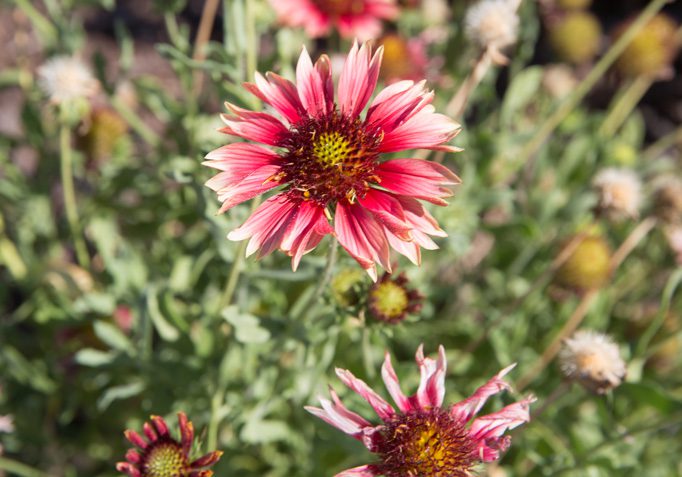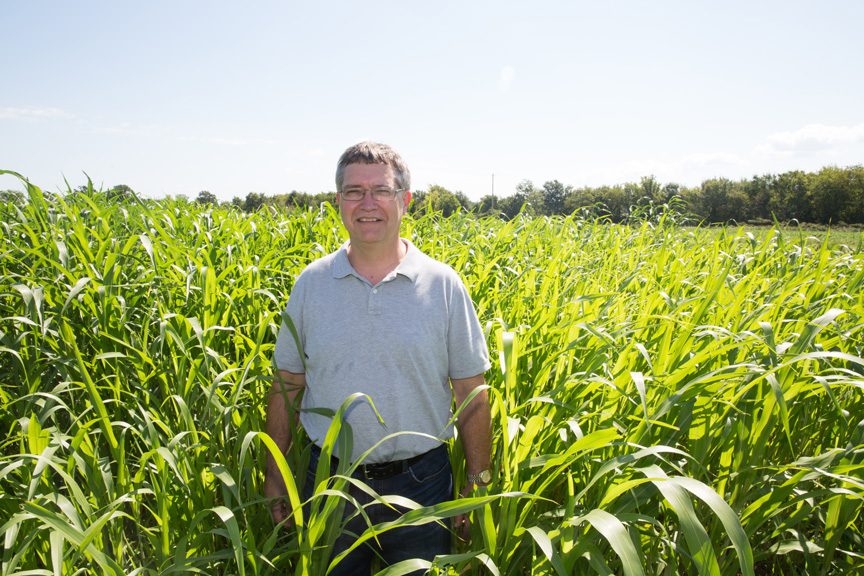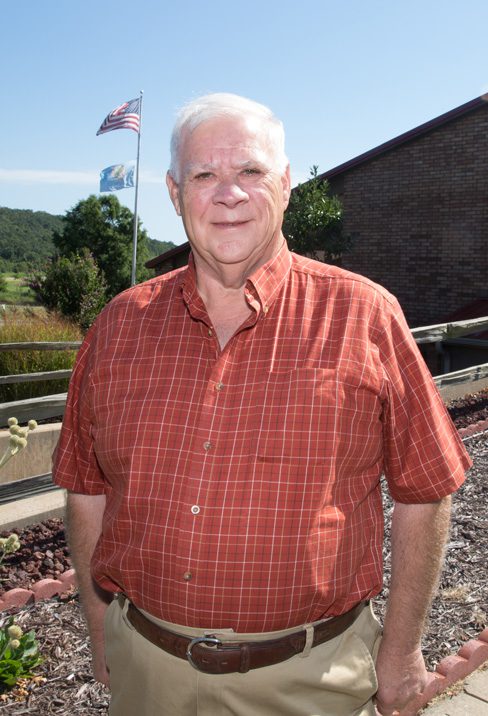Changing the Way We Think and Eat
One of the center’s recent successes was the creation of the farm-to-school program in the state that helps bring healthy, local, fresh food to schoolchildren and teaches them about its importance. Staff members conducted research with school personnel to find out why local foods weren’t used more often and found that convenience of purchasing from large food conglomerates like Sysco was a factor.
“If the Kerr Center hadn’t put its money where its mouth is, the farm-to-school program might never have happened. One of the many great things about being a foundation is that you don’t have to answer to specific constituents,” Horne says. “We have a lot of freedom, and we can pursue avenues that traditional agricultural programs might not be able to. There’s a lot we can accomplish because of that.”

The center, located in Poteau, houses demonstration areas that display various horticulture and livestock strategies for farmers and ranchers to experience.
“The demonstrations that we do really build credibility with farmers because we’re out there doing it and testing things for their benefit,” Horne says. “Sometimes, new strategies don’t always work, but that’s what we’re there for. The demonstrations are a great way for farmers to see hands-on the things they can do and they’re a mainstay of what we do here. It’s a credible place for farmers to see and learn.”
Kerr Center horticulture manager George Kuepper spends a lot of his time in the demonstration garden.
“I get to be outside and work in the fields hands on, as well as learn new things and help spread those ideas to new people. I’m lucky that I get to work here,” Kuepper says.
The demonstration plot is home to many vegetables and various plants, and is also the site of experimentation, Kuepper says. One recent project in the garden was working with a material called biochar.[pullquote]Many of the interns have a concept of sustainable food production but not a lot of practical work experience with it. In this program, they get their hands dirty.”[/pullquote]
“The biochar project was about learning how to work with it and how to benefit from its use,” Kuepper says. “Biochar is a process of making charcoal that is added to the soil. When it’s in biochar form, carbon is very stable in the soil. We have the problem in the south of the burning up of organic matter because of the high temperatures. Enriching the soil with biochar has the potential for long-term carbon incorporation because it holds water and functions as sites for microorganisms. It conditions the soil and works very long-term, with the potential to counter climate change.”
Kuepper, who has been in the field of organic farming for his entire career and at the Kerr Center for eight years, seconds the idea that while things are looking very positive for them today, new and different ideas about farming and ranching weren’t always so accepted.
“At the time I first got involved, you couldn’t use the term ‘organic’ without hearing snickering and being dismissed. Now many universities have organic tracks and sustainable agriculture degrees; it’s no longer odd,” Kuepper says. “There’s still a ways to go, but it has gone in a very positive direction on a lot of fronts. I feel much more optimistic than I once did. I really and truly did not think we’d be at this stage during my lifetime. Maybe when I was in a nursing home, but not while I was still actively working in the field.”
In addition to managing the organic horticulture program, Kuepper also works with the horticulture interns, most of whom are current students or recent graduates. He says that the Kerr Center has benefitted from the work of interns, and vice versa, since its beginnings.
“This part of the program started about seven years ago,” Kuepper says. “Many of the interns have a concept of sustainable food production but not a lot of practical work experience with it. In this program, they get their hands dirty. The academic side of the program is emphasized as well with research they perform that has value to us.”
But even with the studies interns conduct on organic and sustainable growing practices, Kuepper says there is still an aspect of the intern program that he enjoys even more.
“The best thing about it is that I get exposed to great people. If you are ever feeling discouraged on the news by things you might hear about young people, you need to meet our interns who come through here,” Kuepper says. “I feel that they take away a lot from us because we cover a very wide ground.”
The young people Kuepper works with give him further encouragement in the growing public interest in organic methods, he says. Kuepper is also requested for many speaking engagements and presentations at conferences and universities.
“We’re reaching a lot of people that way,” Kuepper says. “It’s exciting.”

Educating Oklahoma’s Agriculture Sector
Like many staff members of the Kerr Center for Sustainable Agriculture, Chief Program Officer David Redhage also has a solid background in farming.
“I grew up on a beef cattle farm, and I have a master’s in agricultural economics,” Redhage says.
Among other duties, Redhage oversees the educational side of the Kerr Center’s mission. At the headquarters, the center offers courses for new and experienced farmers alike, and on topics that vary widely.
“We host workshops on things like managing shiitake mushrooms, blueberry growing and harvesting, best practices for maintaining livestock, how to manage your pastures to reduce the environmental impact and not spraying every pasture every year,” Redhage says. “You can learn something new and then actually apply it; you get the chance to get out in the field and actually see it happen. It’s a valuable opportunity for our farmers.”
Redhage says that one recent project that he is especially proud of is the work done with native pollinators. With a massive decline in the number of honeybees in the country in the past several years, this is a hot topic.
[pullquote]For Oklahoma, we are the one source for people to go to for questions about sustainable agriculture practices, and there is a real demand for that information.”[/pullquote]“Native pollinators is a popular subject right now, which we like to see,” Redhage says. “We need to adapt and figure out ways to stress the importance of wildflowers in agriculture because of the stress that honeybees have been under. With colony collapse syndrome and the mass production of agricultural products, we have to question whether we have enough honeybees left to pollinate. We encourage those who come to our workshops to tell their neighbors to plant native wildflowers.”
Through the Kerr Center’s efforts to educate the public about the importance of wildflowers, especially when understood in context with the honeybee problem, Redhage says they have had great success in raising awareness.
“When farmers and ranchers come to us with questions and leave with new ideas they can implement, that’s what we want to see happen – especially when they take those new ideas and tell their neighbors about them, too,” Redhage says.
Upcoming workshops at the Kerr Center for Sustainable Agriculture include an elderberry session and information about feral hog management, Redhage says. Workshop attendees are often people new to the farming industry, but experienced farmers looking to learn something new also frequent the sessions. The center gets regular questions from people thinking about breaking into the market, Redhage says.
“For Oklahoma, we are the one source for people to go to for questions about sustainable agriculture practices, and there is a real demand for that information,” Redhage says. “When producers call me wanting to get into some system for the first time, I always tell them to start small, especially for those who have no background in farming. Keep your day job, and learn how to produce first, and then make the leap to full-time if you can make it viable. People don’t always realize that you need the up-front resources of the land and equipment paid for, and the knowledge, too. I love to see new people getting into sustainable farming, but I do urge them to take things slowly.”
Redhage also serves as the program manager for the USDA’s Sustainable Agriculture Research and Education Program Professional Development Program, Southern Region.
“That basically means that I coordinate a federal program in partnership with the University of Georgia to train trainers on sustainability,” Redhage says. “It provides grants in 13 southern states, Puerto Rico and the Virgin Islands.”

Redhage reports to the group’s administrative council twice a year, providing updates on the Kerr Center for Sustainable Agriculture’s progress and advancements.
Communications Director Maura McDermott helps keep all of these various balls in the air, so to speak, and works to produce materials that highlight the Kerr Center’s activities. McDermott, who has been with the Kerr Center since 1998, writes material for the organization’s website and maintains and updates its content, edits reports and grants from the staff and publicizes workshops and events, among other roles.
McDermott says that with her background of both growing up on a cattle ranch and her experience in journalism, her position with the Kerr Center is a perfect fit. She, like her coworkers, is also a strong believer in the center’s mission and purpose.
“We have provided so much information through our demonstrations to the public, all at a low cost. We reach out to ranchers, gardeners, people interested in local food and people working to better the population’s overall health,” McDermott says. “And through all of this, the Kerr Center has really been a leader and spurred other organizations over the years, such as the ‘Buy Fresh Buy Local’ movement.”
McDermott says she encourages Oklahomans who might be in any way interested in sustainability farming to check out what the Kerr Center has to offer, because they have many different ways to get involved.[pullquote]We’ve always been known as working for the farmer. We want to see researchers and farmers working as partners.”[/pullquote]
“We are available, and we can help you answer your questions,” McDermott says. “Our website has a lot of resources available, and I’d also encourage people to come out on tours of the center to see what we’re up to. Even if you just have a small yard, you can get involved, and you can help create a more sustainable world.”
Horne agrees that the more people get involved in sustainability practices, the better.
“We aren’t purists; it’s not ‘our way or the highway’ all the time. But the center asks important questions and seeks to find economically profitable ways to farm without hurting the earth. We’re flexible because the world needs more farmers,” Horne says. “We have a strong belief in keeping families on farms, because when fewer people own more land, oftentimes, the right decisions aren’t made. We look to nature for the model and try to stay in harmony with that.”
Looking at the center’s longstanding history, it almost seems impossible to imagine how the organization could do more in the future, but Horne has his ideas.
“We want to keep our antenna out there and continue to look at new options to see what we can accomplish,” Horne says. “We’ve always been known as working for the farmer. We want to see researchers and farmers working as partners. This is a good place to bounce plans, and we have a long record of helping farmers set goals for themselves and their land.”
Because, in the end, Horne says he believes that farming is one of the greatest callings a person can pursue.
“With all the uncertainty in the world – the stock market and terrorism and everything else – living and working on a good farm is one of the best lives a person can have,” Horne says. “I love farmers and our organization does, too.”






















